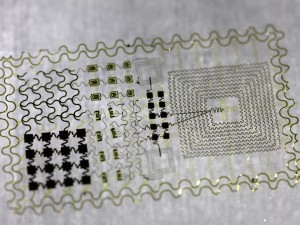Motorola has patented an electronic tattoo
Motorola has patented an electronic tattoo
Motorola has announced the patent of a type of electronic tattoo, which will be placed on the throat and would act as a microphone. Maybe you think that this is a ridiculous idea, but the truth is that electronic tattoos are not new.
The Rogers Research Group at the University of Illinois (at Urbana-Champaign) had already presented an Electronic tattoo this last spring. After they successfully created stick-on electronic tattoos and stretchable batteries, they presented the first electronic sensor to be printed directly onto human skin. These sensors were designed to measure skin hydration, temperature and electrical signals, and can be used to monitor patients in a more comfortable way than conventional measurements. The tattoos are made of water soluble plastics and due to skin exfoliation, they disappear in a couple of weeks.
In John Rogers words:
“It’s a technology that blurs the distinction between electronics and biology.”

If the tattoo is attached to the throat, then it is able to detect differences when we are talking. Motorola has taken this idea to the next level and patented an electronic tattoo with microphone capabilities. This kind of “smart tattoo” could improve voice quality, removing the influence of noise environment.
Motorola’s patent describes the system tattoo-phone as:
“The tattoo includes a microphone, a transceiver for wireless communication with the mobile communication device, a power supply, and a controller coupled to the power supply, the transceiver and the microphone. The controller is operable to receive an initialization signal from the mobile communication device to initiate reception of an audio stream picked up from the microphone and transmit via the transceiver audio signals for the mobile communication device.”
The patent is rich in details about the methods that the tattoo could use to connect to a smartphone. The supply power to the electronic tattoo will come from a near field communication (NFC), so there is no special limitation to the kind of smartphone needed to work with them.
Further information: NewsDiscovery.com, TechBells.
Image Source: John Rogers, University of Illinois
Source: AndroidGuys
